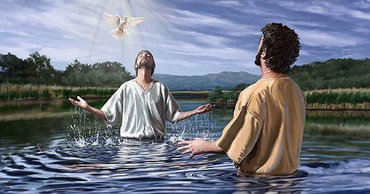Dushan's Website
This, too, shall pass...
Extra
Drowning Of The False Self

Once upon a time an eager disciple asked the master, “How
much water does one need for a valid baptism? How much water is
sufficient?”
This was, so it seems, a very frequent question, as some folks
baptize in the river, some folks baptize in a baptismal pool,
while others baptize with just a few drops of water on the head.
The master turned his gaze towards the disciple and answered,
“A valid baptism needs as much water as it would take to drown
in.”
The word “baptism” derives from the Greek baptizein meaning “to
immerse, to drown, to submerge”. The Greek verb bapto, from
which the verb baptizo is derived, also means “to dip, steep,
dye, color.” What if baptism is all about “drowning”, dying to
the old self and being born to the new self? What if it is about
shedding the false self and putting on the true self? What if it
is about marinating in the Source until one reflects the dye,
the colour and the texture of the source?
Source: Philip Chircop

The Human Odyssey...
The earliest remains of the Homo
sapiens yet discovered dates back to 300,000 years.
We probably evolved in the
African region,
but then migrated to the rest of the world. Although our
physical appearance changed over time, our race didn't: we
remained human beings.
Remains of the world's
earliest religious worship site
have been discovered in Botswana, where our ancestors performed
advanced rituals, worshipping the python some 70,000 years ago.
So many religions have emerged and disappeared that no religion
can claim superiority over other religions. Religion is only one
of the
means to realize God, but
it is not an end to itself.
The central problem facing our planet is human overpopulation.
Today there are over
8 billion beings on Earth and the
population is still growing. There are too many people and
not enough resources for all of us. Yet,
we are not addressing this
problem responsibly. Do you really think your life will be
better if there are more people of your colour,
caste or creed on
Earth?
Initially used as fire for light, heat, cooking and for safety,
energy has been harnessed by humans for millennia. Today, fossil
fuels have become our main energy sources. This is leading to
climate change and global warming.
The Earth has entered a new era called
anthropocene, which marks
the beginning of the
sixth mass extinction. Many species have already disappeared
from the planet and our own days, as a species, are numbered.
Artificial intelligence has surpassed human intelligence. While
humans think they will be using
AI to win wars against other
nations, AI itself has outwitted human psychology to make us
lose each and every war. Warfare has never been a solution to
human problems...